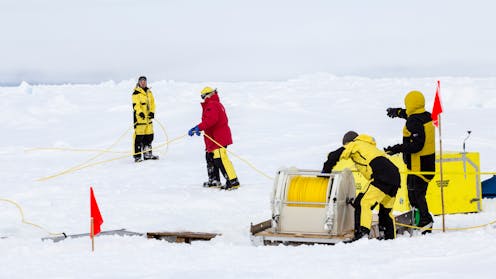Play all audios:
June 12, 2019 Michael J. I. Brown, _Monash University_ Ten years ago, politicians such as Tony Abbott would routinely voice disdain for climate science. Now, while the policy debate remains
fierce, the battleground has shifted to economics and jobs. June 4, 2019 Peter Ellerton, _The University of Queensland_ Calling all people who don’t agree with climate science “deniers” is
neither accurate nor helpful. May 23, 2019 Mark Maslin, _UCL_ Climate scientist Mark Maslin talks to his 13-year old daughter about why she’s going to a climate strike. May 6, 2019 Suzanne
OConnell, _Wesleyan University_ A paleooceanographer describes her ninth sea expedition, this time retrieving cylindrical ‘cores’ of the sediment and rock that’s as much as two miles down at
the ocean floor. April 5, 2019 Robert Kopp, _Rutgers University_ Climate change science was driven by curiosity in the past. Now climate researchers need to focus on managing the risk of
global warming’s ill effects. March 6, 2019 Kate Sambrook, _University of Leeds_ and Thomas Richardson, _University of Leeds_ New and stronger evidence confirms global warming will mean more
intense and frequent floods, heatwaves and droughts. March 1, 2019 Richard Betts, _University of Exeter_ Wildfires broke out across the British Isles during a recent heatwave. But the
burning question of the link to climate change does not have an easy answer. December 20, 2018 Abhishek Kar, _University of British Columbia_ and Hisham Zerriffi, _University of British
Columbia_ Millions of people worldwide are either indifferent to a carbon tax or opposed. If citizens were motivated by potential carbon dividends, maybe politicians would finally take
action on climate change. December 19, 2018 Kevin Cowtan, _University of York_ and Stephan Lewandowsky, _University of Bristol_ New research addresses two questions about the supposed
‘pause’ in warming. November 2, 2018 Scott Denning, _Colorado State University_ According to a new study, the oceans have absorbed more heat from climate change than previously thought. This
could mean the Earth will warm even faster in the future than scientists have predicted. October 8, 2018 Keith Shine, _University of Reading_ Limiting human-induced warming will be tough,
given where we start from. September 26, 2018 Suzanne OConnell, _Wesleyan University_ The ocean floor holds unique information about Earth’s history. Scientific ocean drilling, which started
50 years ago, has yielded insights into climate change, geohazards and the key conditions for life. August 24, 2018 Jonathan Eden, _Coventry University_ Kerala floods show the relationship
between climate change and extreme rainfall is complex. August 14, 2018 Florian Sévellec, _University of Southampton_ The warm period will occur even on top of regular climate change.
September 10, 2020 Kevin Trenberth, _National Center for Atmospheric Research _ With California suffering another devastating wildfire year, more people are wondering about whether and how
global warming is contributing. A climate scientist explains. July 5, 2018 Saskia Beudel, _University of Canberra_ Climate change can seem far removed from our everyday lives, which is why a
citizen science program measuring how frogs are dealing with a warming world is so important. June 13, 2018 Thomas Slater, _University of Leeds_ and Andrew Shepherd, _University of Leeds_
We used 11 different satellite missions to track Antarctica’s contribution to rising sea levels. April 30, 2018 Benjamin Z. Houlton, _University of California, Davis_ Scientists have long
thought most nitrogen in Earth’s ecosystems comes from the air, but new research shows it also is released as rocks weather. This could boost plant growth and help sequester carbon – but not
fast enough to avert climate change, as some pundits have claimed. April 26, 2018 Mark Serreze, _University of Colorado Boulder_ Climate change is transforming the Arctic, with impacts on
the rest of the planet. A geographer explains why he once doubted that human actions were causing such shifts, and what changed his mind. April 3, 2018 Mariel Borowitz, _Georgia Institute of
Technology_ There are more satellites than ever before, orbiting Earth and collecting data that’s crucial for scientists. Why do some nations choose not to share that data openly?

